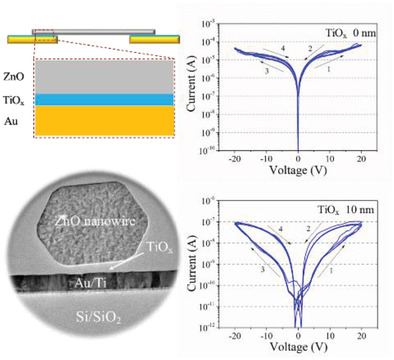
-
- to
Here you will find the paper by Viet Nguyen and David Muñoz-Rojas.
"One‐dimensional semiconductor nanowires have been widely used as important building blocks in a number of devices. However, the performance of these devices is seriously hindered by the surface states/defects on the nanowires, which is a great obstacle to the realization of controllable and predictable characteristics. The introduction of an ultrathin metal oxide layer between Au electrodes and a ZnO nanowire is used to eliminate the surface effects of the nanowires, leading to improved volatile threshold switching performance. Study of the conduction mechanism demonstrates that the TiOx interfacial layer functions as a barrier between the electrodes and the nanowire, wherein the oxygen defects provide localized trap sites for electron hopping in a low electric field as well as assisting electron tunneling in a high electric field. Several key synaptic functions, including excitatory current response, facilitation and depression, and short‐term plasticity, are realized with this modified nanowire device, which is promising for neuromorphic computing applications. Interface engineering between electrodes and semiconductor nanowires can help in the realization of high‐performance memristive devices, allowing new approaches to the assembly of neuromorphic systems with nanometer‐sized features. "


